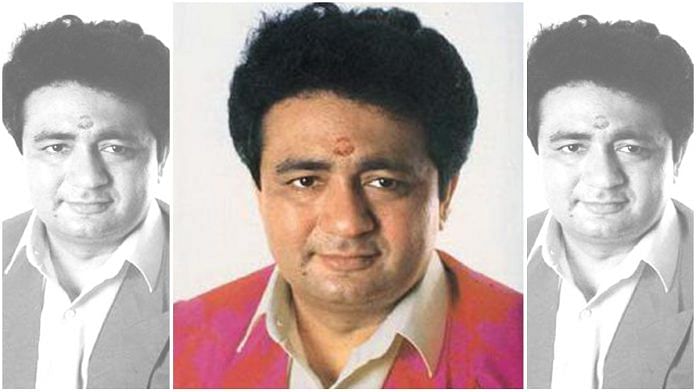New Delhi: For nearly six years in a row, a Swedish comedian, Felix Kjellberg, better known as PewDiePie had held the record of hosting the ‘world’s most subscribed channel’ on YouTube. It was an Indian music channel that dethroned him — T-Series. Founded by India’s ‘Cassette King’ Gulshan Kumar, with 241 million subscribers, T-Series is the most subscribed channel now on YouTube.
From being a fruit juice seller to the ‘music mogul’ before being shot dead in broad daylight by the underworld in 90s Bombay, Gulshan Kumar’s life is one for the movie screens.
In his book, The Bollywood Pocketbook of Iconic Things, author Diptakirti Chaudhuri writes that T-series changed the music scenario for the Bollywood of the 90s.
“After the action-packed movies of the 1980s, music came to the fore with Aashiqui and T-Series changing the economics of the business,” he writes.
From Kumar Sanu to Sonu Nigam, most Bollywood playback singers were discovered by him. It was T-Series under Gulshan Kumar that first brought the format of audio cassettes to India, effectively ending the rule of India’s ‘grand old music label’ HMV. Kumar sold the cassettes at low price and ‘turned music into business’.
Also read: A flop album, a call to the underworld, & a daylight killing — how Gulshan Kumar was murdered
From pauper to prince
Gulshan Kumar Dua was born in the Hindu Punjabi household in Delhi’s Daryaganj in 1956. His father was a fruit juice seller. During the Partition riots his family was forced to flee the Jhang state of West Punjab in Pakistan.
Kumar began helping his father with his business at a young age. A devout and religious person, he used to sing songs in praise of Hindu god Shiva and the goddess Vaishno Devi.
When his family bought a store where records and cheap audio cassettes were sold, he decided to switch gears and start what would become a massive music empire. In 1983, he founded Super Cassettes Industries, an audio cassette manufacturing company. This later turned into what we know today as the music label T-series.
T-Series had a major role in reviving India’s music business in the early 1990s. In an industry dominated by the likes of Mohammed Rafi, Lata Mangeshkar, Kishore Kumar, and Asha Bhosle, for T-Series, it also helped that an entire generation of talented singers was unable to make significant progress. Kumar took advantage of this and roped in vocalists such as Anuradha Paudwal, Mohammed Aziz, Kumar Sanu and Alka Yagnik to sing cover versions of popular numbers, paying them a fraction of what established singers would charge.
Kumar also focused on the distribution network, which formerly consisted of upscale record stores in affluent neighbourhoods. In contrast, T-Series cassettes were sold by the ‘paanwallahs’ and neighbourhood grocery stores.
While the company was gaining a reputation for selling pirated music through Copyright Act exemptions, their first legitimate success came in 1988 with the album Qayamat Se Qayamat Tak. The success of the film’s soundtrack altered the course of the company. And with mega hit Aashiqui (1990) T-Series arrived big. Dil Hai Ke Manta Nahin was another success for the group, but they concentrated more on album production.
While the albums were extremely successful, Kumar ventured into production and tapped into the distribution and sales side of the business, turning his record label into what would then go on to become the biggest music label in the country.
Gulshan Kumar didn’t stop at music. In the 1990s, he tried his hand at several small ventures — from soap and detergent industry to consumer electronics, and numerous other enterprises.
Also read: Why the 1997 Gulshan Kumar murder case remained stuck in two courts for two decades
Death at the height of success
By 1997, T-Series was at the top of the Mumbai music game. And Kumar’s ruthless pricing strategy and alleged “copyright infringements” were sending rival businesses into a tailspin of losses. The entire enterprise was built on pirated music. It wasn’t just record labels that were suffering. Filmmakers also observed that these illegal cassettes reduced their potential profits from music sales.
Contract killers working on behalf of the mafia in Bollywood shot him to death in August 1997. Abdul Rauf alias Daud Merchant, one of the assailants who shot him 16 times on that fateful day in August 1997, was sentenced to life in prison in 2001. Police has also named music composer Nadeem Akhtar Saifee of the famous Nadeem-Shravan duo, as a co-conspirator.
Kumar was also well-known for his religious philanthropy. Years after Kumar’s passing, his son Bhushan Kumar continues to operate a langar the music mogul established at the Vaishno Devi temple. When Kumar was killed, he had gone to take blessings outside a temple in Mumbai.
(Edited by Anurag Chaubey)



